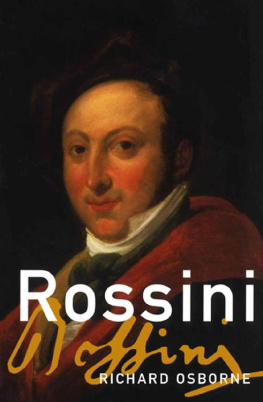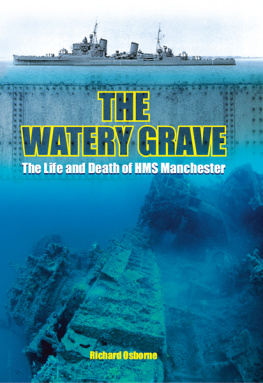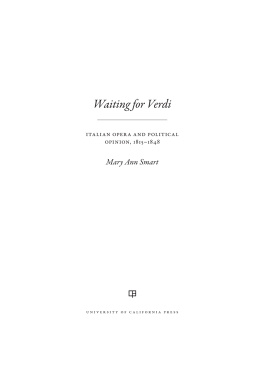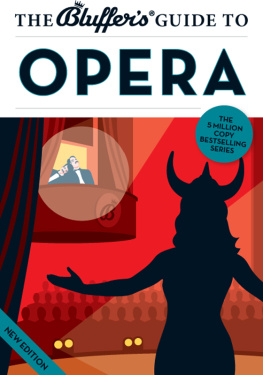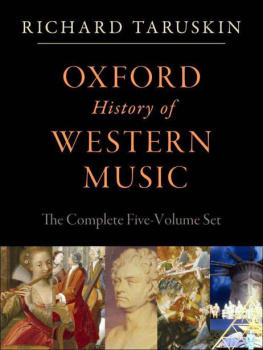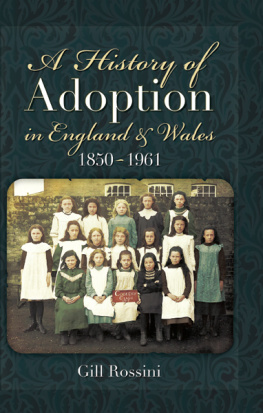THE MASTER MUSICIANS
ROSSINI
Series edited by Stanley Sadie
THE MASTER MUSICIANS
Titles Available in Paperback |
Bach Malcolm Boyd | Mendelssohn Philip Radcliffe |
Beethoven Barry Cooper | Monteverdi Denis Arnold |
Berlioz Hugh Macdonald | Puccini Julian Budden |
Handel Donald Burrows | Purcell J. A. Westrup |
Liszt Derek Watson | Schumann Eric Frederick Jensen |
Mahler Michael Kennedy | Tchaikovsky Edward Garden |
Titles Available in Hardcover |
Mozart Julian Rushton | Schtz Basil Smallman |
Musorgsky David Brown |
THE MASTER MUSICIANS
ROSSINI
His Life and Works
SECOND EDITION

RICHARD OSBORNE


Oxford University Press, Inc., publishes works that further
Oxford Universitys objective of excellence
in research, scholarship, and education.
Oxford New York
Auckland Cape Town Dar es Salaam Hong Kong Karachi
Kuala Lumpur Madrid Melbourne Mexico City Nairobi
New Delhi Shanghai Taipei Toronto
With offices in
Argentina Austria Brazil Chile Czech Republic France Greece
Guatemala Hungary Italy Japan Poland Portugal Singapore
South Korea Switzerland Thailand Turkey Ukraine Vietnam
Copyright 2007 by Oxford University Press, Inc.
Published by Oxford University Press, Inc.
198 Madison Avenue, New York, New York 10016
www.oup.com
Oxford is a registered trademark of Oxford University Press
All rights reserved. No part of this publication may be reproduced,
stored in a retrieval system, or transmitted, in any form or by any means,
electronic, mechanical, photocopying, recording, or otherwise,
without the prior permission of Oxford University Press.
Library of Congress Cataloging-in-Publication Data
Osborne, Richard, 1943
Rossini : his life and works / Richard Osborne.2nd ed.
p. cm.(The master musicians)
Includes bibliographical references and index.
ISBN 9780-19-518129-6
1. Rossini, Gioachino, 17921868.
2. ComposersBiography.
I. Title.
ML410.R8O9 2007
782.1092dc22
[B] 2006030179
1 3 5 7 9 8 6 4 2
Printed in the United States of America
on acid-free paper
FOR
HAILZ-EMILY
AND
HARRY
I love Italian operaits so reckless. Damn Wagner, and his bellowings at Fate and death. Damn Debussy, and his averted face. I like the Italians who run all on impulse, and dont care a damn about their immortal souls, and dont worry about the ultimate.
D. H. Lawrence,
letter to Louie Burrows,
1 April 1911
Tous les genres sont bons
Hors le genre ennuyeux.
Gioachino Rossini,
letter to Filippo Filippi,
26 August 1868
Preface to First Edition (1985)
DESPITE THE WIDESPREAD POPULARITY OF A HANDFUL OF HIS works, Rossini has some claim to being the most neglected and generally misunderstood of all the great nineteenth-century composers. Indeed, it is a measure of this neglect that no full-length study of his life and works has appeared in English for over fifty years.
The reasons for the decline in Rossinis reputation in the years following his death will be touched on later; but it can be said at the outset that his art and personality have always been something of an enigma, naturally resistant to the quick and easy solutions readily on offer. The grounds for the popularity of his better-known works are not difficult to find. Rossinis most characteristic music is rhythmically vital, sensuous, and brilliant; full of the finest animal spirits, wrote Leigh Hunt in his Autobiography of 1850, yet capable of the noblest gravity. It might also be agreed that Rossinis natural stance is a detached one, detached enough for his admirers to think him a fine ironist and for his detractors to dub him cynical. But the image which devolves from thisRossini as a gifted but feckless amateur, who at an early age abandoned his career to the otiose pleasures of the tablebears no relation to the facts of the career as we have them. The man, who in his lifetime was happy to cultivate a mask of casual unconcern, was in reality an odd mixture of affability and reserve, industry and indolence, wit and melancholy. And there were other paradoxes, too. A classicist by training and a conservative by inclination, Rossini nonetheless broke the mould of the old Italian operatic order and laid the foundations for a new generation of romantically inspired music-dramatists. The persona foisted on the young Rossini by an adoring public was, in fact, little more than an agreeable fiction. Yet it was a fiction which provided Rossini with the protection he needed: both as a creative artist anxious to make his mark in a rumbustious and changing world, and as a man increasingly prey in his later years to debilitating bouts of physical and mental illness. The truth is, Rossini was not only one of the most influential, he was also one of the most industrious and at the same time one of the most emotionally complex of nineteenth-century composers.
To understand this, it is necessary to look afresh at Rossinis life and at the conditions which existed in Italy and France during his long career; for without an informed knowledge of the context in which Rossini wrote, it is impossible to arrive at a secure idea of how the works themselves might best be assessed and revived. And unfashionable as it now is to separate out life and works, the works themselves merit separate, and chronological, treatment: for ease of reference and in order to avoid the kind of damaging generalisations which have bedevilled some earlier Rossini criticism. Only by considering each of Rossinis thirty-nine operas, his principal choral works, and the substantial body of late piano and vocal music can we properly prepare the ground for more informed, general discussion of his art and influence.
In adopting this approach, I have not, I hope, neglected some larger issues. The principal facets of Rossinis arthis mastery of the comic medium, the nature of his treatment of the seria and semiseria genres, and, above all, his evolution of those new and far-reaching forms which were to dominate Italian operatic procedures for the next fifty yearsare dealt with in the context of the work-by-work guide to his output. Thus the chapters on such pivotal works as Tancredi, Litaliana in Algeri, Il barbiere di Siviglia, La Cenerentola, La gazza ladra, Armida, Mos in Egitto, Ermione, Maometto II, and Guillaume Tell serve a double purpose: surveying the work in question, whilst at the same time examining issues central to any proper assessment of Rossinis style and method. I have included a separate chapter on Rossinis use of the overture, and another () setting out some of the problems we need to bear in mind as we approach the works.
Assessment of the operas continues to be hampered by the fact that none of us has seen the entire opus in the theatre, let alone the entire opus sympathetically produced and sung, with the right kind of orchestra in the right size auditorium. As Rossini himself affirmed in conversation with Wagner in 1860: It is only in the theatre that it is possible to bring equitable judgment to bear on music meant for the stage. Nor do we have the benefit of a complete set of scholarly texts. Reading nineteenth-century vocal scores is no substitute for the detailed examination of the mass of materialsincluding the important variants sanctioned by Rossini himselfwhich goes to make up a critical edition. Happily, an edition is underway. And though it will be many decades before its seventy or so volumes are complete, the initiative, begun at the Fondazione Rossini, Pesaro, in the early 1970s, has already yielded a mass of materials germane to a fresh understanding of Rossini and his music. This Rossini Edition, under the joint editorship of Bruno Cagli, Philip Gossett, and Alberto Zedda, is one of the great musicological enterprises of our time; without its example and without the detailed findings it has thrown up in the last ten years, this book could not have been written.
Next page
